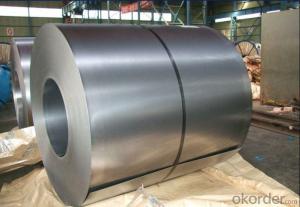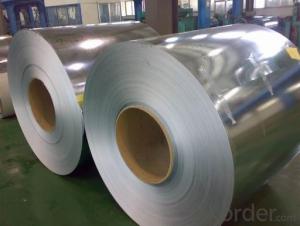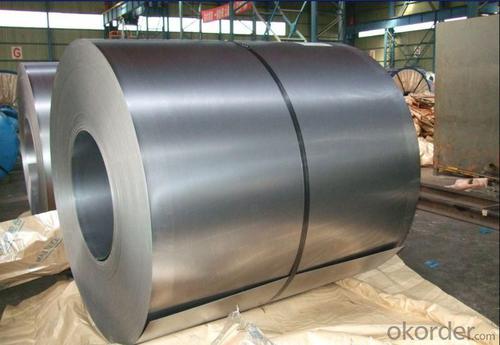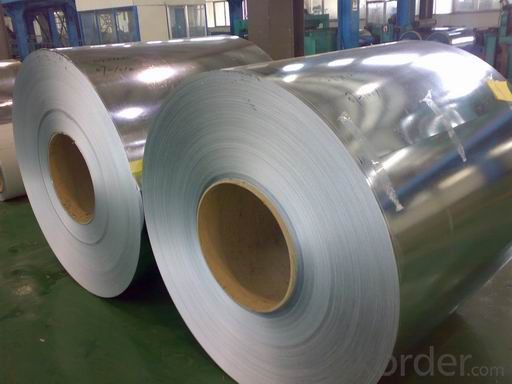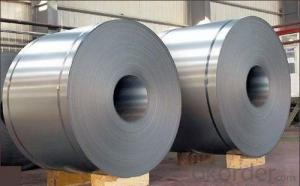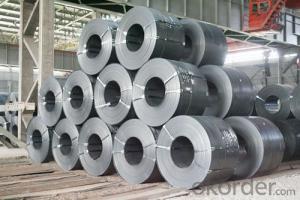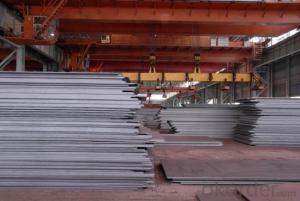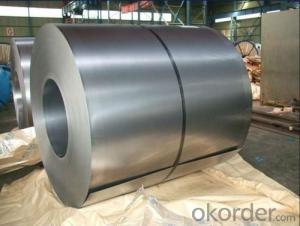Grade Q450NQR1 Corten Steel Coil 2.5*1250*C
- Loading Port:
- Shanghai
- Payment Terms:
- TT or LC
- Min Order Qty:
- 100 m.t
- Supply Capability:
- 20000 m.t/month
OKorder Service Pledge
OKorder Financial Service
You Might Also Like
Grade Q450NQR1 Corten Steel Coil 2.5*1250*C
Description:
-Grade: 09CuPCrNi-A
-Specification: 2.5*1250 in coil
Chemical Composition(%) of Grade Q450NQR1 Corten Steel Coil 2.5*1250*C:
| C | Si | Mn | P | S | Cu | Ti/V | Cr | Ni | RE |
| ≤0.12 | 0.25~0.75 | 0.20~0.50 | 0.060~0.12 | ≤0.020 | 0.25~0.50 | / | 0.30~1.25 | 0.12~0.65 | / |
Mechanical Properties of Grade Q450NQR1 Corten Steel Coil 2.5*1250*C:
| Thickness(mm) | Y.S(MPa) | T.S(MPa) | EL. A5% | Bend 180o | Impact Test | |
| oC | AKV J | |||||
| 2.0~≤6.0 | ≥345 | ≥480 | ≥24 | d=a | Normal/-40 | ≥47/≥21 |
| >6.0~12.0 | d=2a | |||||
Application of Grade Q450NQR1 Corten Steel Coil 2.5*1250*C:
Used in different weather. It has good anti rust protection and welding ability and is used in shipping container,support frame of outside building etc. Remarkably enhances the anti-corrosive performance of the structural element, lengthens the structural element service life, uses in manufacturing each kind of structural element which was used under the atmospheric envirenment and the caustic gas, the liquid envirenment.
Payment:
-Invoicing on theoretical weight or actual weight as customer’s request.
-FOB, CFR or CIF.
-Regular terms of payment:
1, 30% payment in advance, the remaining balance (70% payment) against the copy of B/L.
2, 30% payment in advance, the remaining balance (70% L/C) against the copy of B/L.
3, Negotiable.
-The payment terms will be written in contraction detailedly.
FAQ:
Q1: Why buy Materials & Equipment from OKorder.com?
A1: All products offered byOKorder.com are carefully selected from China's most reliable manufacturing enterprises. Through its ISO certifications, OKorder.com adheres to the highest standards and a commitment to supply chain safety and customer satisfaction.
Q2: How do we guarantee the quality of our products?
A2: We have established an advanced quality management system which conducts strict quality tests at every step, from raw materials to the final product. At the same time, we provide extensive follow-up service assurances as required.
Q3: How soon can we receive the product after purchase?
A3: Within three days of placing an order, we will arrange production. The shipping date is dependent upon the quatity, how many sizes you want and the plan of production, but is typically 1 month to 2 month days from the beginning of production.
Images of Grade Q450NQR1 Corten Steel Coil 2.5*1250*C:
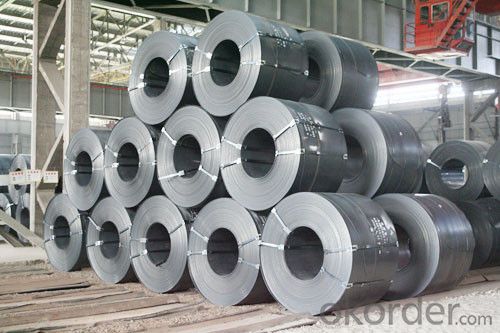
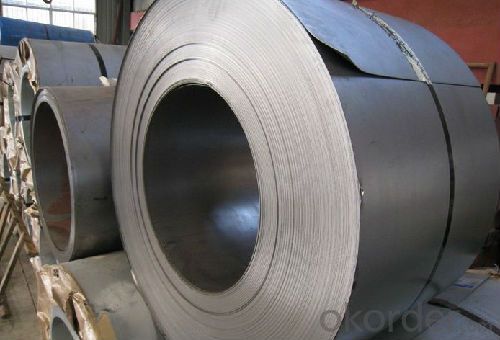
*If you would like to get our price, please inform us the size, standard/material and quantity. Thank you very much for your attention.
- Q: How does the corrosion resistance of special steel compare to regular steel?
- The corrosion resistance of special steel is generally superior to regular steel. Special steel is specifically designed to have enhanced resistance against corrosion due to its composition and manufacturing process. It often contains higher levels of alloying elements such as chromium, nickel, and molybdenum, which form a protective layer on the surface of the steel, preventing it from reacting with corrosive substances. Regular steel, on the other hand, typically has a lower corrosion resistance due to its composition and lack of alloying elements. It is more prone to rusting and other forms of corrosion when exposed to moisture, atmospheric gases, or chemicals. Furthermore, special steels may undergo additional treatments such as heat treatment, passivation, or coating to further enhance their corrosion resistance. These treatments help create a barrier against corrosive agents, extending the lifespan and durability of the steel in corrosive environments. In summary, special steel offers superior corrosion resistance compared to regular steel due to its composition, alloying elements, and additional treatments. This makes it a preferred choice in applications where corrosion resistance is critical, such as in marine environments, chemical processing plants, or infrastructure exposed to harsh weather conditions.
- Q: What are the key properties of special steel?
- The key properties of special steel include high strength, excellent corrosion resistance, good heat resistance, and superior mechanical properties. Additionally, special steel is known for its exceptional hardness, toughness, and wear resistance, making it suitable for various applications in industries such as automotive, aerospace, and construction.
- Q: What is the difference between general steel and special steel?
- Special steel: it is an important symbol to measure whether a country can become a steel power. It is the main steel used in most industries such as machinery, automobile, military industry, chemical industry, household electrical appliance, shipping, traffic, railway and new industries. China's special steel industry is responsible for the special steel products needed by the key industries such as defense industry, high and new technology industry and machinery and automobile industry. China manufacturing growth to provide a space for the development of domestic special steel, sustained and rapid development of manufacturing industry, especially in machinery, automobile, machinery, shipbuilding and other industries, the strong demand of special steel, become the direct impetus to support excellent steel market.
- Q: How does special steel perform in cryogenic creep resistance?
- Special steel is renowned for its outstanding capability to resist cryogenic creep. Cryogenic creep refers to the deformation that materials undergo under constant stress in extremely low temperatures. Unlike other materials, special steel demonstrates superior resistance to this type of deformation, thanks to its distinct composition and manufacturing processes. The frigid environment encountered in cryogenic applications can weaken conventional materials and render them more susceptible to creep deformation. Nevertheless, special steel is purposefully designed to withstand these demanding conditions. Its composition typically contains a higher proportion of alloying elements, such as nickel, chromium, and molybdenum, which enhance its mechanical properties and bolster its resistance to cryogenic creep. Additionally, special steel undergoes meticulous heat treatment and processing techniques to optimize its microstructure and fortify its grain boundaries. Consequently, the resulting material possesses improved strength, toughness, and resistance to creep deformation, even at extremely low temperatures. The exceptional performance of special steel in cryogenic creep resistance renders it highly suitable for applications involving the storage, transportation, or processing of materials at cryogenic temperatures. Industries such as aerospace, energy, and scientific research heavily rely on special steel to construct cryogenic storage tanks, superconducting magnets, cryogenic valves, and more. To conclude, special steel's remarkable performance in resisting cryogenic creep can be attributed to its unique composition, heat treatment, and processing techniques. Its ability to maintain its mechanical properties and withstand deformation at extremely low temperatures makes it an ideal choice for various cryogenic applications.
- Q: How does special steel contribute to reducing weight in applications?
- Special steel contributes to reducing weight in applications through its unique properties and manufacturing processes. Special steel alloys are engineered to have high strength-to-weight ratios, allowing them to provide the same structural integrity as conventional steel but at a reduced weight. These alloys often contain elements like chromium, nickel, and molybdenum, which enhance their strength and durability. Additionally, special steel can be manufactured through advanced techniques such as hot rolling, cold rolling, and heat treatment. These processes further refine the steel's microstructure, improving its mechanical properties while maintaining a lightweight composition. By using special steel in various applications, such as automotive parts, aerospace components, and construction materials, manufacturers can achieve weight reduction without compromising performance or safety.
- Q: What are the different types of corrosion-resistant steel?
- There are several types of corrosion-resistant steel, including stainless steel, weathering steel, and galvanized steel. Stainless steel is the most common type, known for its high resistance to corrosion due to the presence of chromium. Weathering steel forms a protective rust-like layer, providing long-term corrosion resistance. Galvanized steel is coated with a layer of zinc, which acts as a barrier against corrosion.
- Q: How is special steel used in the production of pressure vessels?
- Special steel is used in the production of pressure vessels due to its unique properties that make it suitable for withstanding high pressure environments. Pressure vessels are containers designed to hold gases or liquids at a pressure significantly different from the surrounding atmosphere. These vessels are commonly used in industries such as oil and gas, chemical, and power generation. The use of special steel in pressure vessel production is crucial to ensure the safety and reliability of these containers. Special steels, such as carbon steels, stainless steels, and alloy steels, offer enhanced mechanical properties, high strength, and excellent corrosion resistance. These properties are essential for withstanding the extreme pressure conditions experienced by pressure vessels. One of the primary functions of special steel in pressure vessel production is to provide resistance against internal pressure. The steel needs to be able to withstand the force exerted by the contents of the vessel without deforming or rupturing. The high strength and toughness of special steels make them capable of handling these pressures, ensuring the integrity of the vessel and preventing catastrophic failures. Special steel also plays a vital role in maintaining the structural integrity of pressure vessels. These vessels are subjected to various external loads, such as wind, seismic forces, and thermal expansion. The superior mechanical properties of special steel enable it to bear these loads without significant deformation or failure, ensuring the structural stability of the pressure vessel. Furthermore, special steel's resistance to corrosion is essential in the production of pressure vessels. Pressure vessels often contain corrosive substances, and the corrosive environment can lead to the degradation of the material over time. Special steels, especially stainless steels, offer excellent resistance to corrosion, minimizing the risk of material deterioration and maintaining the vessel's longevity. In summary, special steel is used in the production of pressure vessels due to its high strength, toughness, and corrosion resistance. These properties enable the steel to withstand high pressure conditions, maintain structural integrity, and prevent corrosion-related failures. By utilizing special steel, pressure vessel manufacturers can ensure the safety, reliability, and longevity of these critical containers.
- Q: What are the applications of special steel in aerospace engineering?
- Special steels play a crucial role in aerospace engineering due to their unique properties and capabilities. These steels are specifically designed to meet the demanding requirements of the aerospace industry, where high strength, excellent corrosion resistance, and extreme temperature resistance are of utmost importance. Here are some key applications of special steel in aerospace engineering: 1. Aircraft engine components: Special steels, such as stainless steels, are used extensively in the manufacturing of aircraft engine components. These steels offer superior strength, corrosion resistance, and high-temperature resistance, making them ideal for critical parts like turbine blades, compressor discs, and shafts. 2. Landing gear systems: The landing gear of an aircraft is subjected to significant stress and impact during takeoff, landing, and taxiing. Special steels, known for their excellent strength, toughness, and fatigue resistance, are employed in the fabrication of landing gear components like struts, axles, and shock absorbers. 3. Structural components: Aerospace structures need to withstand dynamic loads, vibrations, and extreme environmental conditions. Special steels, such as high-strength low-alloy (HSLA) steels, are used in various structural components like wings, fuselage frames, and support structures. These steels offer exceptional strength-to-weight ratios, ensuring structural integrity while minimizing weight. 4. Fasteners: Special steel fasteners, such as bolts, screws, and rivets, are vital for joining different components in aerospace applications. These fasteners are typically made from high-strength steels, providing excellent tensile and shear strength, as well as corrosion resistance, to ensure secure and reliable connections. 5. Fuel system components: Special steels with high resistance to corrosion, such as stainless steels, are used in the construction of fuel system components like tanks, pipes, and valves. These steels prevent fuel leakage and maintain the integrity of the system, even when exposed to harsh environments. 6. Electrical connectors: Aerospace electrical systems require reliable and efficient electrical connectors. Special steels, often with high electrical conductivity and corrosion resistance, are used in manufacturing connectors, ensuring optimal performance and longevity. In summary, special steels find extensive use in aerospace engineering due to their exceptional properties. Whether it is for critical engine components, landing gear systems, structural applications, fasteners, fuel systems, or electrical connectors, these steels provide the necessary strength, corrosion resistance, and temperature stability required to ensure safe and efficient aircraft operation.
- Q: How is tool steel used in the manufacturing of molds and dies?
- Tool steel is commonly used in the manufacturing of molds and dies due to its excellent hardness, toughness, and wear resistance properties. It is used to create molds and dies that can withstand high pressures and temperatures during the manufacturing process. Tool steel is ideal for shaping and forming materials, such as plastic or metal, as it provides the necessary strength and durability to produce accurate and precise components. Additionally, tool steel can be easily machined and heat-treated to enhance its performance, making it an essential material in the manufacturing industry.
- Q: What is the fatigue strength of special steel?
- The fatigue strength of special steel refers to its ability to withstand repeated loading and unloading cycles without failure or deformation. It is typically higher than that of regular steel due to its unique composition and manufacturing process, which enhances its resistance to fatigue and improves its durability in demanding applications.
Send your message to us
Grade Q450NQR1 Corten Steel Coil 2.5*1250*C
- Loading Port:
- Shanghai
- Payment Terms:
- TT or LC
- Min Order Qty:
- 100 m.t
- Supply Capability:
- 20000 m.t/month
OKorder Service Pledge
OKorder Financial Service
Similar products
Hot products
Hot Searches
Related keywords
